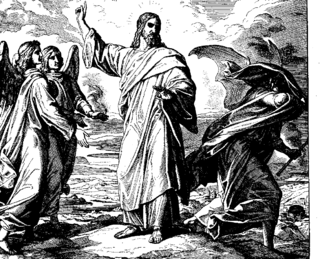
Matthew 4:10 is the tenth verse of the fourth chapter of the Gospel of Matthew in the New Testament. Jesus has rebuffed two earlier temptations by Satan. The devil has thus transported Jesus to the top of a great mountain and offered him control of the world to Jesus if he agrees to worship him. In this verse, Jesus rejects this temptation.

Matthew 5:23 and Matthew 5:24 are a pair of closely related verses in the fifth chapter of the Gospel of Matthew in the New Testament. They are part of the Sermon on the Mount. Jesus has just announced that anger leads to murder, and anger is just as bad as murder itself. And that whosoever is angry with his brother shall be in danger of the judgment himself. This verse states that resolving these disputes should take priority over religious rituals.

Matthew 5:26 is the twenty-sixth verse of the fifth chapter of the Gospel of Matthew in the New Testament and is part of the Sermon on the Mount. Jesus has just warned that if you do not reconcile with your enemies a judge is likely to throw you in jail. In this verse Jesus mentions that your debts must be paid completely before one can leave.

Matthew 5:27 and Matthew 5:28 are the twenty-seventh and twenty-eighth verses of the fifth chapter of the Gospel of Matthew in the New Testament and is part of the Sermon on the Mount. These verses begin the second antithesis: while since Matthew 5:21 the discussion has been on the commandment: "You shall not murder", it now moves to the commandment: "You shall not commit adultery".

Matthew 5:29 is the twenty-ninth verse of the fifth chapter of the Gospel of Matthew in the New Testament and is part of the Sermon on the Mount. It is the third verse of the discussion of adultery.

Matthew 5:33 is the thirty-third verse of the fifth chapter of the Gospel of Matthew in the New Testament and is part of the Sermon on the Mount. This verse is the opening of the fourth antithesis, beginning the discussion of oaths.

Matthew 5:38 is the thirty-eighth verse of the fifth chapter of the Gospel of Matthew in the New Testament and is part of the Sermon on the Mount. This verse begins the antithesis on the commandment: "Eye for an eye".

Matthew 5:39 is the thirty-ninth verse of the fifth chapter of the Gospel of Matthew in the New Testament and is part of the Sermon on the Mount. This is the second verse of the antithesis on the command: "eye for an eye". In one of the most famous verses in the New Testament, Jesus here rejects revenge and retaliation, instead telling his followers to turn the other cheek.
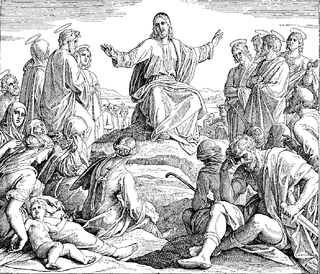
Matthew 5:43 is the forty-third verse of the fifth chapter of the Gospel of Matthew in the New Testament and is part of the Sermon on the Mount. This verse is the opening of the final antithesis, that on the commandment to "Love thy neighbour as thyself".

Matthew 6:3 is the third verse of the sixth chapter of the Gospel of Matthew in the New Testament and is part of the Sermon on the Mount. This verse continues the discussion of how one should give to charity.

Matthew 6:4 is the fourth verse of the sixth chapter of the Gospel of Matthew in the New Testament and is part of the Sermon on the Mount. This is the final verse of the Sermon's discussion of alms giving.

Matthew 6:17 is the seventeenth verse of the sixth chapter of the Gospel of Matthew in the New Testament and is part of the Sermon on the Mount. This verse continues the discussion of fasting.

Matthew 6:18 is the eighteenth verse of the sixth chapter of the Gospel of Matthew in the New Testament and is part of the Sermon on the Mount. This verse concludes the discussion of fasting.

Matthew 6:21 is the twenty-first verse of the sixth chapter of the Gospel of Mathew in the New Testament and is part of the Sermon on the Mount. This verse continues the discussion of wealth.

Matthew 6:22 is the twenty-second verse of the sixth chapter of the Gospel of Matthew in the New Testament, and is part of the Sermon on the Mount.
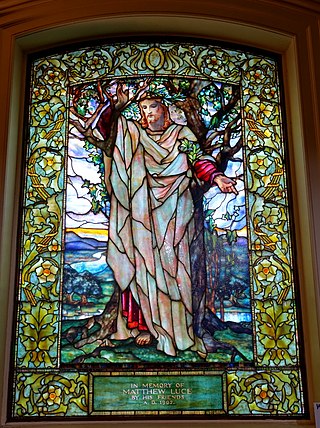
Matthew 6:23 is the twenty-third verse of the sixth chapter of the Gospel of Matthew in the New Testament and is part of the Sermon on the Mount.
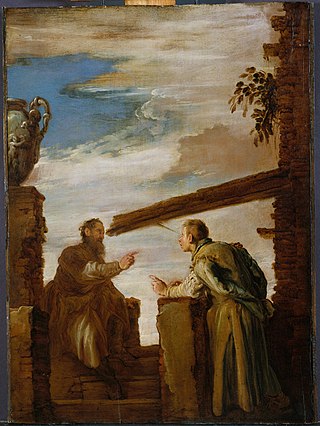
Matthew 7:3 is the third verse of the seventh chapter of the Gospel of Matthew in the New Testament and is part of the Sermon on the Mount. This verse continues Jesus' warnings addressed to those who judge others.

Matthew 7:4 is the fourth verse of the seventh chapter of the Gospel of Matthew in the New Testament and is part of the Sermon on the Mount. This verse continues the gospel's discussion of judgmentalism.
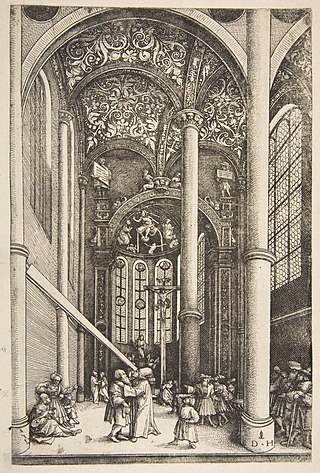
Matthew 7:5 is the fifth verse of the seventh chapter of the Gospel of Matthew in the New Testament and is part of the Sermon on the Mount. This verse continues the discussion of judgmentalism.
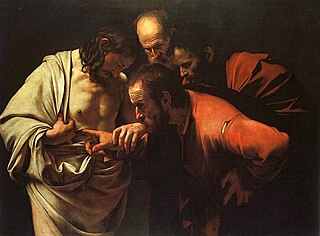
John 20:27 is the twenty-seventh verse of the twentieth chapter of the Gospel of John in the New Testament. It records Jesus' reappearance to the disciples, including Thomas, eight days after his resurrection.




















